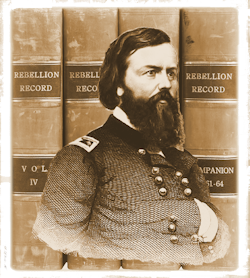February 28.—The British ship Labuan, of Hull, England, arrived at New York, in charge of a prize-crew from the United States sloop-of-war Portsmouth. She was captured by the Portsmouth a few miles to the northward of Brecca Chica, a small village near the Rio Grande, and it is supposed that she intended to run the blockade. The vessel is worth £33,000. Her cargo consists of a large quantity of blankets, etc.
—Counterfeit five-dollar Treasury notes made their appearance in New-York. They were excellent imitations of the genuine. The letters “U.S.,” one within the other, on the shield in the goddess of liberty, being left out.
—This day was observed throughout the Confederate States, in accordance with a proclamation issued by Jefferson Davis, as a day of “fasting, humiliation and prayer.” The rebel President appointed the day as a fitting occasion on which to make a grateful acknowledgment of the watchful care of Providence during the existence of the provisional government.
—The rebel steamer Nashville, from Southampton, England, commanded by R. P. Pegram, of the confederate navy, ran the blockade of Beaufort, North-Carolina, and reached the town this morning in safety.—(Doc. 68.)
—The United States transport steamer Mississippi, having on board Major-General B. F. Butler and fourteen hundred troops, ran aground on Frying-pan Shoals, off Wilmington, N. C, while on her way from Boston, Mass., to Ship Island, in the Gulf of Mexico. Her situation being discovered by Commander O. S. Glisson, U.S.N., he immediately went to her assistance with the steamer Mount Vernon; and after laboring in vain for many hours, during which about three hundred troops were transported to the Mount Vernon, the Mississippi was finally got off at about seven o’clock in the evening. The troops were then transferred back to the Mississippi, and every man saved.—(Doc. 69.)
—Charlestown, Va., situated on the line of the Winchester and Potomac Railroad, eight miles southwest of Harper’s Ferry, was this day occupied by the National troops.
—Capt. Nolen, of the Seventh Illinois cavalry, with sixty-four men, while making a reconnoissance of the country west of Charleston, Mo., came across ninety rebel cavalry, commanded by Jeff. Thompson, and after pursuing them a long distance, forced them to make a stand about five miles below Sikeston.
Thompson’s artillery was planted in the road in such a manner as to command all approaches, and the National forces were compelled to charge in the face of his battery. This they did with great gallantry, and succeeded in capturing four guns and putting the confederates to flight, with a loss of one man, who straggled from the command and was taken prisoner. The rebel loss was not ascertained.—Cincinnati Gazette, March 4.



